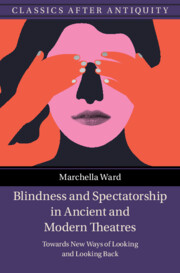 Blindness and Spectatorship in Ancient and Modern Theatres
Blindness and Spectatorship in Ancient and Modern Theatres Book contents
- Blindness and Spectatorship in Ancient and Modern Theatres
- Classics after Antiquity
- Blindness and Spectatorship in Ancient and Modern Theatres
- Copyright page
- Dedication
- Contents
- Figures
- Acknowledgements (Situating Knowledges)
- Notes on the Text
- Introduction: Looking and Looking Back
- Chapter 1 Towards Visual Activism
- Chapter 2 Blindness and / as Punishment
- Chapter 3 Blindness as Metaphorical Death
- Chapter 4 Blindness as Second Sight
- Interlude: Colonial Visions
- Chapter 5 Blindness and Spectatorship
- Conclusion: Assembling the Future
- Bibliography
- Index
Introduction: Looking and Looking Back
Published online by Cambridge University Press: 30 November 2023
- Blindness and Spectatorship in Ancient and Modern Theatres
- Classics after Antiquity
- Blindness and Spectatorship in Ancient and Modern Theatres
- Copyright page
- Dedication
- Contents
- Figures
- Acknowledgements (Situating Knowledges)
- Notes on the Text
- Introduction: Looking and Looking Back
- Chapter 1 Towards Visual Activism
- Chapter 2 Blindness and / as Punishment
- Chapter 3 Blindness as Metaphorical Death
- Chapter 4 Blindness as Second Sight
- Interlude: Colonial Visions
- Chapter 5 Blindness and Spectatorship
- Conclusion: Assembling the Future
- Bibliography
- Index
Summary
This introduction begins by setting up the core question of this book: why is it that disability is still frequently used as a metaphor, despite awareness that this is harmful – and what can we as readers and receivers of classical texts do about it? The role played by spectators, by models of reception, and by ways of understanding vision in this problem are underlined. The chapter introduces the concept of assemblage theory, seeing it as something that arises out of the focus on the reader evident in reception theory’s beginnings. It draws out some of the benefits of an assemblage-thinking model, weighing them against other ways of understanding reception and relation. It closes with some examination of the various activisms and limitations evident throughout the book.
Keywords
- Type
- Chapter
- Information
- Blindness and Spectatorship in Ancient and Modern TheatresTowards New Ways of Looking and Looking Back, pp. 1 - 35Publisher: Cambridge University PressPrint publication year: 2023
